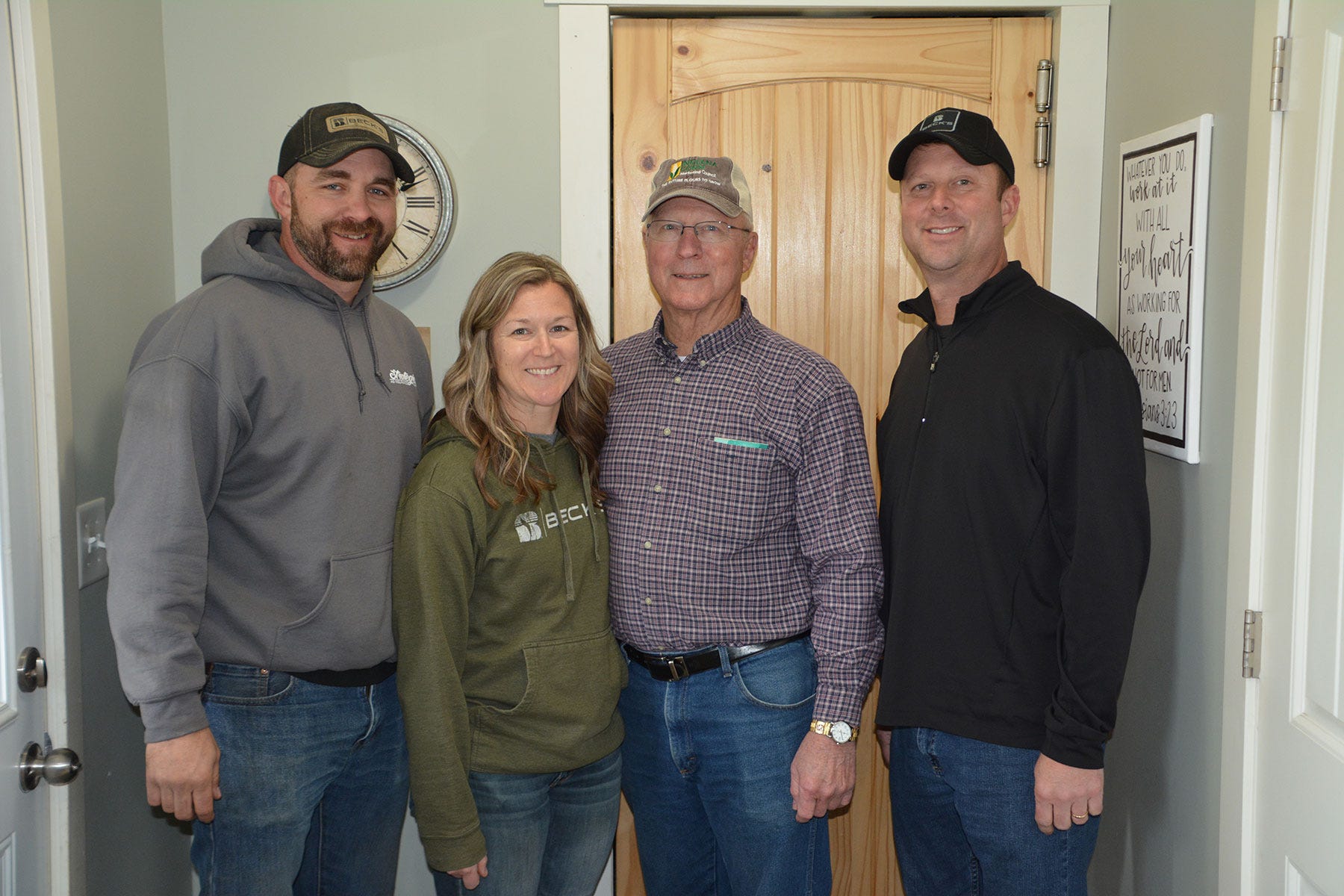“Master Farmers can be viewed in many ways. Some grow their operations to be successful for generations, while others improve agriculture for everyone around them. Tim Gauck has done both.”
That’s how Roger Dumond, retired from a career in precision agriculture and as safety director for Kova Fertilizer, Greensburg, Ind., describes 2024 Indiana Master Farmer Tim Gauck. It was Dumond’s response as nominator when asked, “What qualifies this person to be a Master Farmer?” No one could have said it better.
Dumond continues: “Tim qualifies because he is a successful farmer who improved his farm and grew it profitably. The farm changed with the times, and the operation always looks for ways to be innovative through crops and marketing.”
That’s high praise, especially for someone who puts an asterisk by his own description of himself as a third-generation farmer. “My dad, Quirin, wasn’t a full-time farmer,” Tim explains. “He loved agriculture, but it was my granddad Joe Raver who was my mentor.”
The farm was recognized for innovation and progress even before Tim returned in 1974. It had the first round baler in the county, an Allis-Chalmers Roto-baler, and the county’s first four-wheel-drive tractor.
From hogs to drones
Livestock was important when Tim began farming, he recalls. They once produced 500 head of beef cattle and marketed 6,000 hogs per year.
Longtime employee George Trenkamp played an integral part in making the livestock enterprises successful. Recently retired after more than 40 years of service, Trenkamp still stops by occasionally, just coincidentally when there are things in need of repair in the shop, or planting or harvest is in full swing.
“We phased out of livestock as agriculture changed and our buildings grew older,” Tim says. “We later tore down some structures to build storage for tools and for the seed business.”
Soil conservation was always important on this rolling farm, not blessed with flat, black soils. Grass waterways and water and sediment control basins were installed in the 1980s, and filter and buffer strips are also used where needed.
“We transitioned to no-till and capitalize on using cover crops today,” Tim says. “Cereal rye is one of our go-to choices, and we also continue to try other mixes." Getting cover crops planted and up and growing in the fall is sometimes a challenge. At first, they planted cover cops with a drill, but found it time-consuming and not always timely for getting the seed in. They moved up the seeding date with aerial application, but that also had drawbacks. Then, they built their own pull-behind seeder, which does just enough tillage to get seed incorporated.
Last fall, they planted some cover crops with a drone. “We’re still trying to move up the seeding date, and using technology to do it,” Tim says.
Beyond the farm
Tim not only seeks to make his farm more productive, but also gives of himself to improve agriculture in Decatur County and across the U.S. A 4-H club leader for 35 years, he has always supported 4-H and the cause it represents: educating youth.
When he raised livestock, Tim was involved in the Decatur County Beef Cattle Association and the Decatur County Pork Producers Association. At the state level, he was a director for the Indiana Beef Cattle Association from 1982 through 1985.
Today, Tim devotes his time to organizations that help expand products for corn and soybeans. He is president of the Indiana Corn Marketing Council.
“It’s important to give back,” Tim says. “Dedicated family members and employees make it possible for me to participate in these activities.”

FAMILY SUCCESS: Tim Gauck’s farming operation relies on help from family. Pictured are (from left) Kevin and Diana (Gauck) Horstman, Tim, and Steve Gauck.
Family business
Tim is the first to acknowledge that his farming operation is a family business. Hard work and insight from dedicated family members make it tick.
His daughter, Diana, came back to farm alongside her dad in 2009. “She was the second woman to be involved in farming,” Tim says. “Her grandmother, my mom, Margaret, was involved, too.”
Diana’s husband, Kevin Horstman, joined the operation in 2013. Tim’s son, Steve, works full time for Beck’s as a regional agronomy manager, but he also assists on the farm. He and his wife, Kimmie, have their own freezer beef, pork and chicken business, operating as Gauck Meats.
Tim operated a seed sales business at one time. Today, Kevin and Diana run the Beck’s seed dealership, not only selling seed but also warehousing seed for other local Beck’s dealers on the farm. In addition, Kevin and Diana operate KDH Trucking and own a separate entity, KDDK Farms.
Change with times
When it comes to farm enterprises, flexibility shines through in this operation. If it makes sense as an enterprise and allows more family members an opportunity to become involved, Tim is open to trying it.
“We raised sunflowers for the birdseed market for a few years,” he notes. “We’ve done custom bale wrapping and custom no-tilling over the years, too.
“For a while, we raised and sold sod. It was profitable and provided an extra source of income. When the housing market waned around 2012, we opted to discontinue it and returned those acres to corn and soybeans.”
Tim seeks premiums on his corn and soybeans instead of just growing straight commodity crops when possible. The farm grows non-GMO corn and non-GMO waxy corn, marketing to specialty markets and to a bourbon producer, and they have grown some clear-hilum, non-GMO soybeans for overseas export. They also produce seed beans.
“We have experimented with lots of specialty crops and have not been afraid to try different things,” Tim says. “Working together as a family has made it all possible.”






